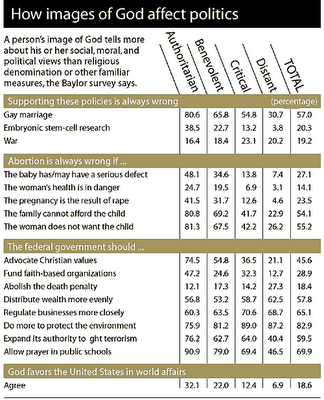Americans and Religion.
Yet, it would be wrong to see American believers as a monolithic block and the picture is more complex than many people tend to see it. As we all know, there is for instance a great variety of denominations in the U.S.:

Only 10.9% are "unaffiliated" but more than 60% of those "unaffiliated" say they believe in God or a higher power, nearly 1/3 of them say they pray at least occasionally and 11% believe Jesus is the son of God. Just of Americans 5.2% consider themselves atheist.
This is just one way to look at the diversity in religion in the U.S. but even within, say, the evangelical Protestant group, there are some differences in belief.
And indeed what is much more telling about how Americans see the world is how they perceive their God and there too, there is great variety. For instance according to this research we can see 4 major different view of God:
- The Authoritarian God: highly involved in daily lives and world affairs (capable of meting out punishment to the unfaithful and ungodly).
- The Benevolent God : a positive influence in lives and in the world, and less willing to punish.
- The Critical God : does not interact with the world, and views the current state of the world unfavorably.
- The Distant God : neither active nor angry but simply a cosmic force that set the laws of nature in motion.

This, by the way, would support George Lakoff's argument that ordinary conceptual system may be metaphorical in nature and that our view of politics is shaped by whether our view of God leans toward a "strict father model" (the Authoritarian God) or a "nurturant parent model, ("the benevolent God). This also supports the idea that our understanding of the world is shaped by the dominant paradigm of the community we belong to, whether religious or social.
0 Comments:
Post a Comment
<< Home